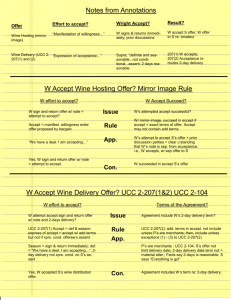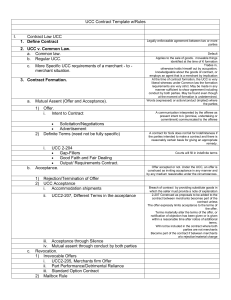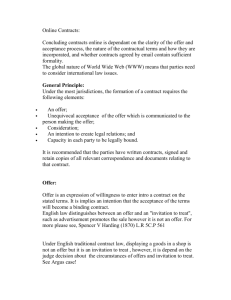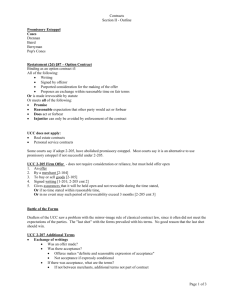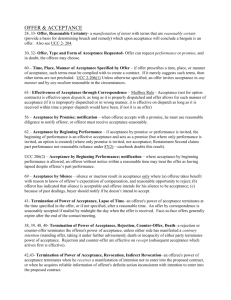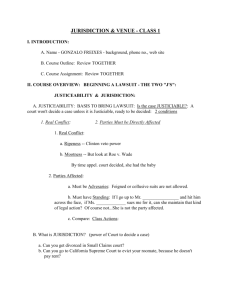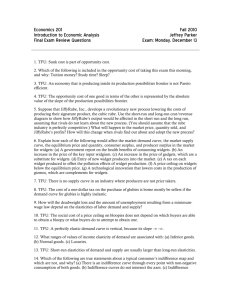mid-prac-108-S07
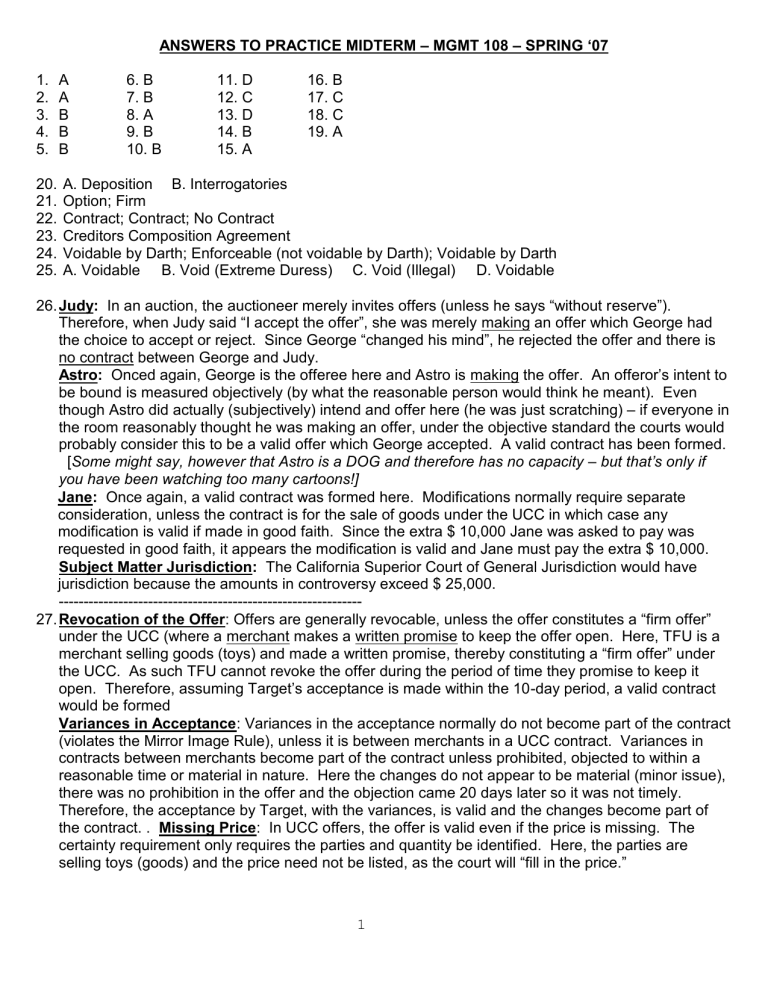
ANSWERS TO PRACTICE MIDTERM
– MGMT 108 – SPRING ‘07
1. A
2. A
3. B
4. B
6. B
7. B
8. A
11. D
12. C
13. D
5. B
9. B
10. B
14. B
15. A
20. A. Deposition B. Interrogatories
21. Option; Firm
16. B
17. C
18. C
19. A
22. Contract; Contract; No Contract
23. Creditors Composition Agreement
24. Voidable by Darth; Enforceable (not voidable by Darth); Voidable by Darth
25. A. Voidable B. Void (Extreme Duress) C. Void (Illegal) D. Voidable
26. Judy:
In an auction, the auctioneer merely invites offers (unless he says “without reserve”).
Therefore, when Judy said “I accept the offer”, she was merely making an offer which George had the choice to accept or reject. Since George “changed his mind”, he rejected the offer and there is no contract between George and Judy.
Astro: Onced again, George is the offeree here and Astro is making the offer. An offeror’s intent to be bound is measured objectively (by what the reasonable person would think he meant). Even though Astro did actually (subjectively) intend and offer here (he was just scratching) – if everyone in the room reasonably thought he was making an offer, under the objective standard the courts would probably consider this to be a valid offer which George accepted. A valid contract has been formed.
[ Some might say, however that Astro is a DOG and therefore has no capacity
– but that’s only if you have been watching too many cartoons!]
Jane: Once again, a valid contract was formed here. Modifications normally require separate consideration, unless the contract is for the sale of goods under the UCC in which case any modification is valid if made in good faith. Since the extra $ 10,000 Jane was asked to pay was requested in good faith, it appears the modification is valid and Jane must pay the extra $ 10,000.
Subject Matter Jurisdiction: The California Superior Court of General Jurisdiction would have jurisdiction because the amounts in controversy exceed $ 25,000.
-------------------------------------------------------------
27. Revocation of the Offer : Offers are genera lly revocable, unless the offer constitutes a “firm offer” under the UCC (where a merchant makes a written promise to keep the offer open. Here, TFU is a merchant selling goods (toys) and made a written promise, thereby constituting a “firm offer” under the UCC. As such TFU cannot revoke the offer during the period of time they promise to keep it open. Therefore, assuming Target’s acceptance is made within the 10-day period, a valid contract would be formed
Variances in Acceptance : Variances in the acceptance normally do not become part of the contract
(violates the Mirror Image Rule), unless it is between merchants in a UCC contract. Variances in contracts between merchants become part of the contract unless prohibited, objected to within a reasonable time or material in nature. Here the changes do not appear to be material (minor issue), there was no prohibition in the offer and the objection came 20 days later so it was not timely.
Therefore, the acceptance by Target, with the variances, is valid and the changes become part of the contract. . Missing Price : In UCC offers, the offer is valid even if the price is missing. The certainty requirement only requires the parties and quantity be identified. Here, the parties are selling toys (goods) and th e price need not be listed, as the court will “fill in the price.”
1
Acceptance : Even though the offer was sent by FAX and the acceptance by mail, the UCC provides that “any reasonable means” can be used to accept an offer. Acceptances are generally valid when they are dispatched or mailed. Consequently, under the Mail Box Rule, when Target mailed their acceptance on September 10 (within the 10 days of the irrevocable offer), a valid contract was formed. Therefore, Target will prevail in a lawsuit against TFU for breach of contract as all three issues favor Target’s position.
Specific Performance : ( this concept will not be tested on the Midterm ) Whether Target can sue for specific performance depends on the kind of goods. Normally, specific performance is not available in a goods contract, unless the goods are unique. If the G.I. Barbie dolls were unavailable elsewhere and are considered unique, then Targe will prevail for specific performance. Otherwise,
Target is limited to suing for money damages only.
----------------------------------------------------------------------
28. Arkansas Court : The rule is that personal jurisdiction in a court is based on presence, domicile or consent (express or implied if minimum contacts exist). Minimum contacts exist when a defendant does business or injures someone in the state. Here, Jones was doing business in Arkansas by attending a conference there and signing the contract there. Therefore, there are minimum contacts and grounds exist to sue in Arkansas.
Texas Court : Here, if Clinton files suit in Texas and serves Jones while she is in Texas, jdx. exists based on the “Presence” rule cited above.
California Court : Here, Defendant Jones is domiciled in California and Jones could therefore sue in a Calif. Court. Since more than $ 25,000 is involved, the Superior Court of General Jurisdiction would be the proper trial court to initiate the lawsuit.
Federal Court : In federal court jdx. exists where there is a Federal Question or diversity of citizenship (plus $ 75,000 in damages). Here, Jones & Clinton reside in different states (diversity) and the suit is for $ 100,000 (therefore above the $ 75,000 minimum) so federal court jurisdiction is proper.
Specific Performance : ( this concept will not be tested on the Midterm ) In a goods contract, specific performance is normally not available unless the goods are unique. Assuming computer equipment is
NOT unique, then only money damages would be available to Clinton.
-------------------------------------------------------------------
NOTE TO STUDENTS : In answering each essay issue, please follow the IRAC method, as follows:
I - Issue – You don’t need to repeat the question, but please identify or label it in some way so that I know you are going to be discussing the question. Please avoid one long 1.5 page paragraph containing the answers to all the issues raised. See how sample essay answers above are labeled.
R – Rule – BEFORE you discuss the facts of the case it is wise to mention the Rule of Law.
E.g., “the Rule is that offers are revocable unless an option contract (value paid to keep it open) or a firm offer (Merchant makes offer in writing)”. Only AFTER stating the rule should you then discuss the facts of the case within the context of the rule or law.
A – Application – Apply the rule to the facts of the question. E.g. “Here, the offer is [or is not] revocable, because…” (SET OUT FACTS that support your conclusion).
C – Conclusion – Tell me your final conclusion (i.e. answer the question): “Therefore… conclusion
” (e.g. “Therefore, the offer was not revocable and there is a valid contract”) .
2

